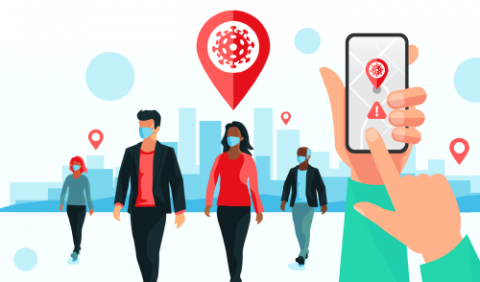
In this article, we focus on data protection and privacy, and how organizations may have to act to the changing scenario during the COVID-19 pandemic.
The spread of the COVID-19 and its rapid escalation into a pandemic in the early months of 2020 marks the first truly major, widespread global health emergency.
Each and every sector of our economy had to do adjustments for continued business in the outbreak of Covid-19. One of the biggest struggles for all businesses is to handle responsibilities regarding data privacy and protection, where the guidelines are still being developed and new challenges are being faced every day. This global health crisis has forced government as well as public and private organizations to introduce several measures to tackle this crisis and help limit the spread of COVID-19. COVID-19 pandemic has resulted in an unprecedented disruption of social and business activities across the globe, and it would only be fair to assume that the evolving situation would continue to demand more resources, enlistment, focus, and expenditure in times to come.
In this pandemic, organizations should be aware that the steps taken by them to keep going do have an impact on the privacy of individuals and that they should be given a choice to draw the line between safety measures benefiting public health and invasive controls impacting the privacy of individuals. Private organizations are creating their own plans by introducing further controls in order to comply with government measures and to protect their workforce and these measures involve the processing of different types of personal data including health data etc. An organization’s exposure to data privacy issues is largely a function of their business model, what data they collect, and how they process, store, and share that data.
The quick digital transition created by the effects of Covid-19 poses a significant compliance challenge, especially given the prevailing attitude of organizations towards data privacy compliance. Due to a lack of ability to deal with data privacy and protection in the wake of Covid-19, data privacy, security, and management have become a major problem for most organizations.
Furthermore, procedures, such as temperature recording and staff and visitor screening, have been implemented in response to Covid-19, although in most cases without necessary protections or adherence to compliances. Another source of concern has been a lack of investment in cybersecurity as well as a shortage of qualified employees to deal with issues like data security.
Most organizations have only awareness of the data they collect, let alone the reasons and motivations for doing so. These can be particularly damaging in customer-focused industries like retail, which collect data at breakneck speed yet lack even a simple audit of data procedures. Analyzing the type and quantity of data being processed and mapping them to the goals and possible departments that may want access to such data is a basic technique that can lay the groundwork for a strong data management system in an organization.
It's important not to think about data privacy and security in isolation. At the end of the day, every employee who works for an organization must be educated on the importance of data security. Regular training sessions and clear policies on the use of devices and networks inside the organization can be extremely cost-effective compliance measures.
Organizations handling personally identifiable information, financial data, and/or health information must have in place robust cyber security protocols to limit the risk of data and privacy breaches. The price of installing cybersecurity solutions is typically a deterrent for businesses, yet any effort to protect data would be futile without them. Surprisingly, many businesses overlook the cybersecurity requirements followed by their IT vendors, such as cloud providers. Organizations that utilize IT in-house should consider conducting a gap analysis to determine their current level of compliance and the areas where they fall short. This would serve as a starting point for determining the levels of data protection that the organizations can achieve while keeping business issues in mind.
In this pandemic, the organizations have to shift to the work from home (WFH) model so that the economy does not come to a halt. Work from home has become the foreseeable future for those in the professional and service sector in order to be able to continue with businesses. In this regard, the practical approach should be communicated constantly with the employees regarding data privacy and protection policies. Organizations to be secured should remind the employees of their confidentiality duties of the data available with them regarding their clients/customers as well as the liabilities that will befall both the organization and the employee for such voluntary and/or careless breaches.
While organizations are now battling to coordinate to the new prerequisites of changing their organizations during the pandemic and lockdown, it is important to think about the beneath and execute strategies not done hereto or to remind representatives, sub-workers for hire, merchants, again of the secrecy and information assurance approaches to set up.
Some of the actions that organizations need to carry out as quickly as time permits are to prepare internal policies with HR, IT, and the management for collecting, maintaining, and storing personal data and sensitive personal data in the organization, develop internal protocols regarding how to handle a Covid -19 positive case, when to report to outside authorities/ government, how to inform and evacuate other employees, how to treat the data of medical and travel history or clients/ customers/ visitors, especially from other countries, prepare work from home policies, etc.
Covid 19 has compelled organizations to take a high-level leap. It becomes urgent for organizations to cover the necessities which have as of now been existing and adjust to the new prerequisites during the Covid-19 outbreak for information security and insurance. Moral, ethical, and reasonable policies must be implemented to safeguard the employees and the organization in the best possible manner.
